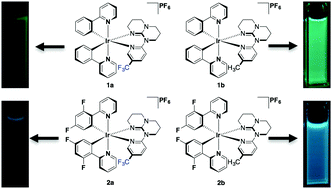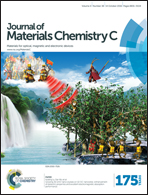Controlling the emission efficiency of blue-green iridium(iii) phosphorescent emitters and applications in solution-processed organic light-emitting diodes†
Abstract
We show that the emission efficiency of blue-green phosphorescent emitters can be controlled through coupling of the excited state to vibrational modes. We controlled this vibrational coupling through choice of different ligands and as a result, complexes with CF3-groups on the ancillary ligand were essentially non-emissive (ΦPL < 1%), whereas with isosteric CH3-groups the complexes were strongly emissive (ΦPL > 50%). Emission of the complexes can be drastically improved (30 times higher ΦPL compared to degassed solution for the CF3-containing complexes) by blending them with an inert solid host such as PMMA, which mitigates metal-ligand vibrations. Solution-processed organic light-emitting diodes made from these materials showed efficiency as high as 6.3%.


 Please wait while we load your content...
Please wait while we load your content...